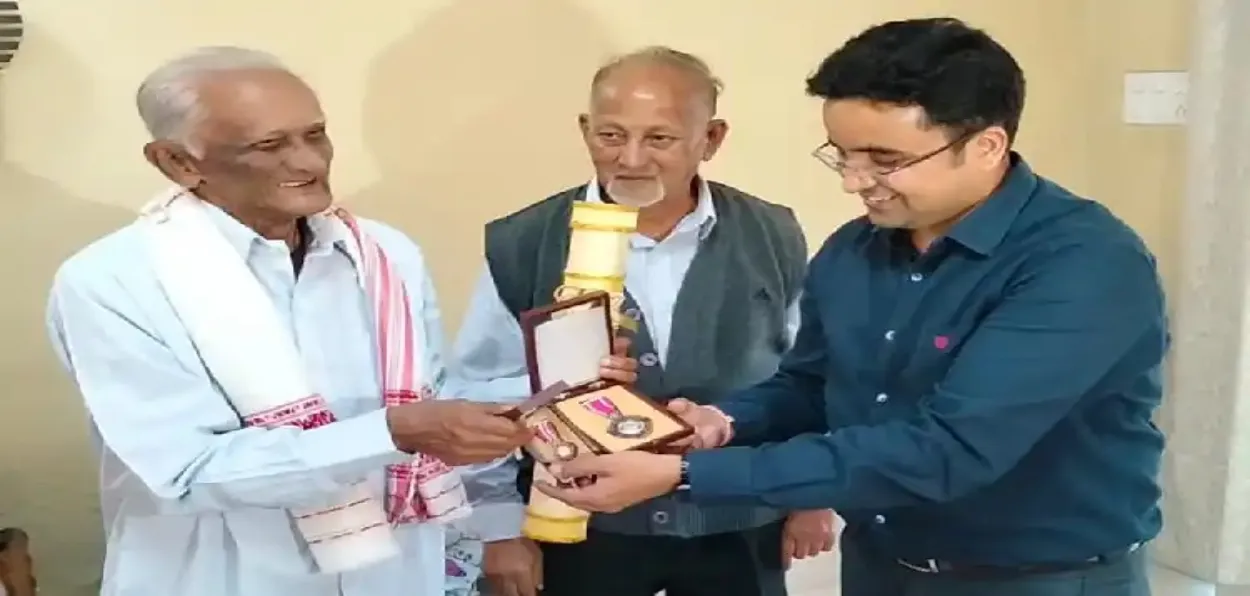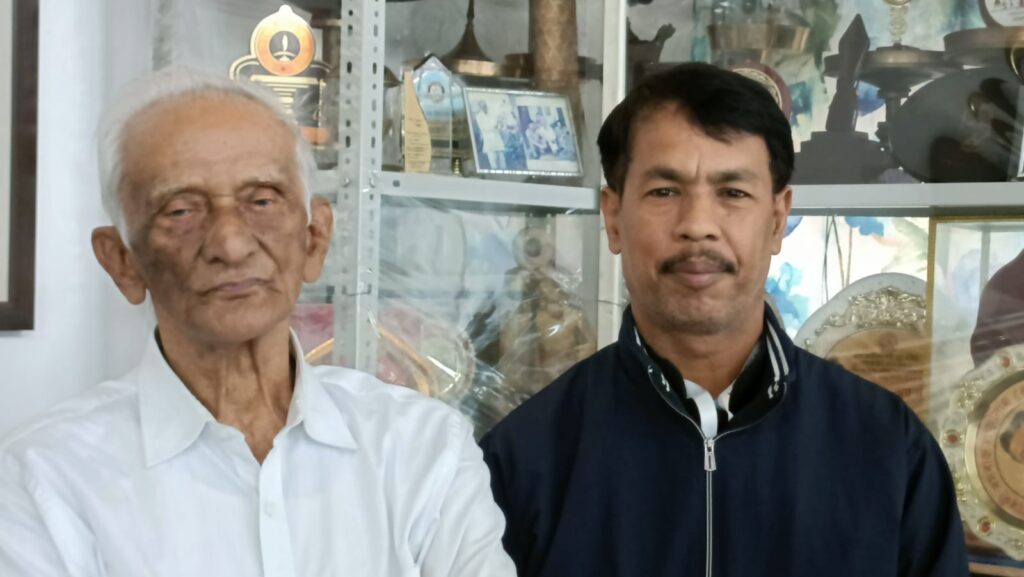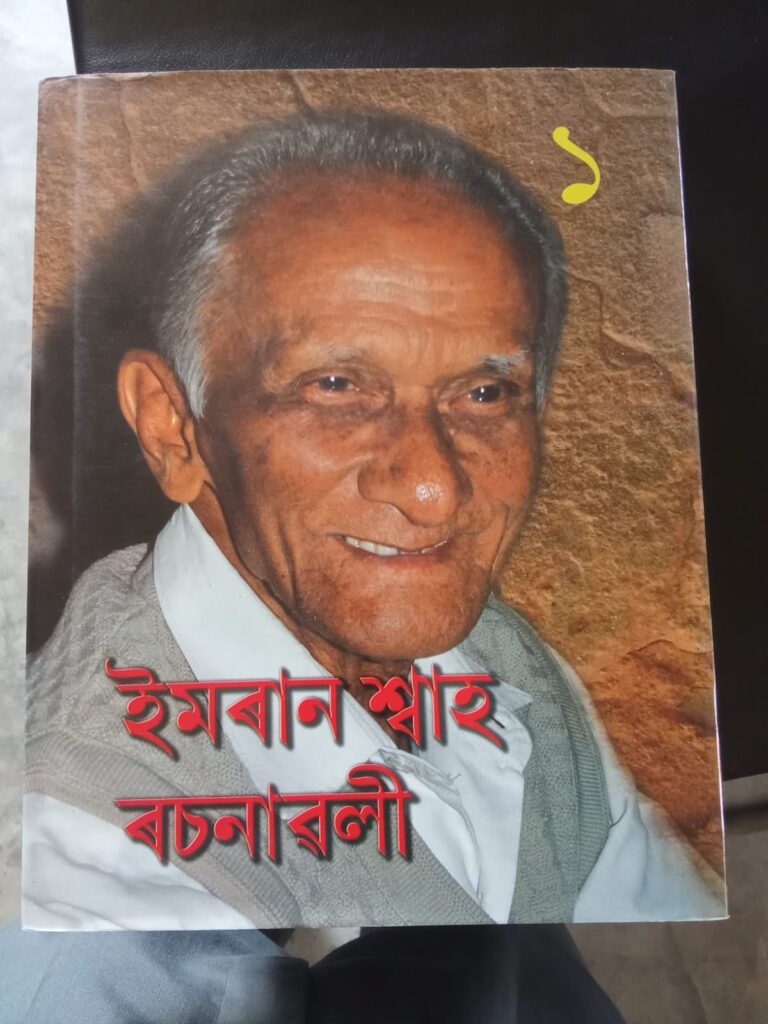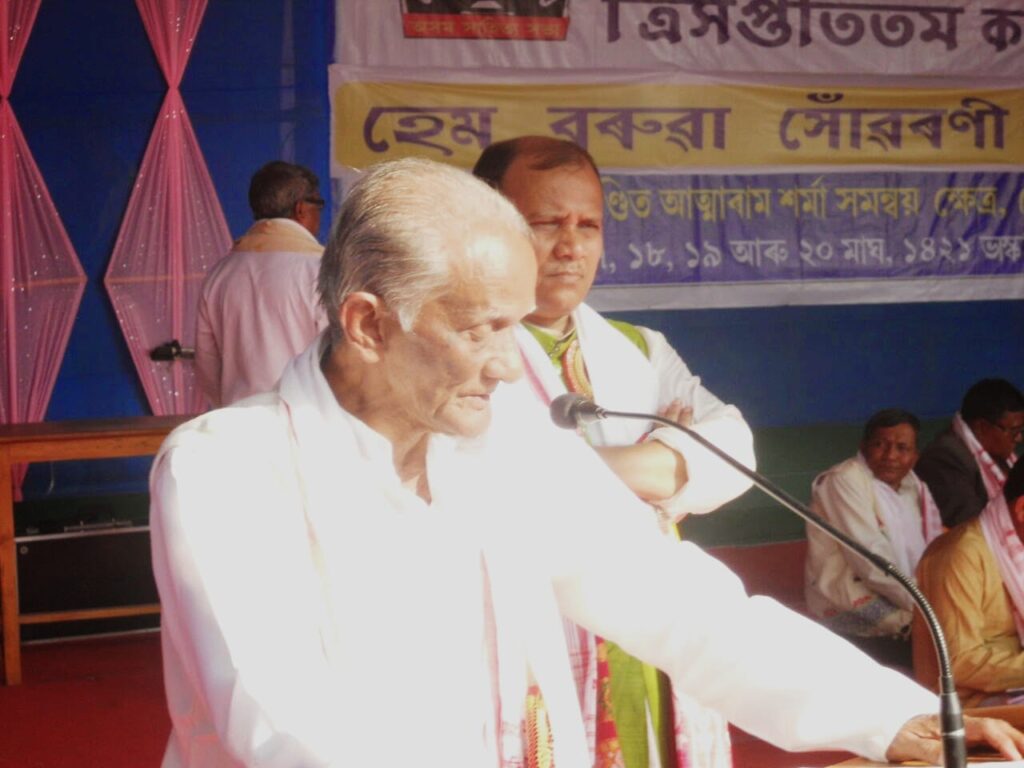Dhai Ali (Sivasagar), ASSAM:

If Dr Bhupen Hazarika is known as the Bard of the Brahmaputra, Imran Shah is the Nawab of Assamese literature. Known for his powerful writings, this soft-spoken and shy doyen is one of the literary giants of Assam. Imran Shah, 90, invariably wears a smile on his face and flashes it even to strangers. Honoured with the Padma Shri in 2021, Imran Shah, a wizard in wordplay, the poet, lyricist, writer, novelist, playwright, scholar and educationist has enriched Assamese literature with his works.
He is generally called the Nawab of Assamese writing but he also writes under the pen names Ishan Dutta, Anamika Baruah, Kumbhakarna, and Animesh Baruah. He has also been conferred with the Assam Valley Literary Award (2009) by Magor Education Trust, Ajan Pir Award (2008) by the government of Assam, Sahityarathi Lakshminath Bezbarua Award (2022), Sabdwa Sahitya Award, Syed Abdul Malik Award (2013), Rangpur Gaurav Award (2016), Bor Asom Samannoy Award (2021) and many more for his contributions to the Assamese literature. He has so far published his 19 Novels, innumerable short stories, and poetry collections and many more manuscripts are ready to go to press.

Born on 23 November 1933 at Dhai Ali, Sivasagar, Imran Shah rates Assamese literature as the best in contemporary India. He says three Assamese litterateurs have so far been awarded the – Jnanpith – India’s highest award in litterateur. This distinction is achieved by no other Indian language so far. The former Asam Sahitya Sabha president is disappointed to see the lack of promotion of Assamese literature. He feels Assamese literature is still facing a lack of patronage as far as publishing is concerned. The ‘Assamese by heart and soul’ is also unhappy with the government trying to create a divide in the Assamese society – majority, minority, indigenous, etc.
Awaz-The Voice caught up with Imran Shah for a tête-à-tête at his Dhai Ali residence in Sivasagar town in eastern Assam. Excerpts:
To begin with, please tell us what inspired you to take up the pen and paper.
It all started during my school days (at Sibsagar Govt HS & MP School) when I used to compose poems for my friends. I penned several short poems for them. However, I was not seriously into poetry at that time. Soon I gained confidence, and my first anthology Banavashi (1951) was published while I was in Class IX. (His classmate Liyakat Hussain was the publisher). Inspired by my friends in Class X, I wrote my first novel Sangeetor Hkhipaare (1952, again published by Liyakat Hussain).
Soon after my college life started, I took up the pen to write seriously. My short story was published in Ramdhenu, then a highly influential Assamese literary magazine in 1957-58. Since then I have been writing without a break. I write whatever I like, and people give me a lot of love in return.
Which is your most prized work so far and why do you like it so much?
I have no answer because I love all my creations. If you ask me which one is your favourite creation, I would say I like all the short stories, novels, and poems I have penned. Based on contemporary psycho, I go on writing on varied subjects. I can’t answer which is my favourite.

For which work you had to work the hardest and why?
Imran Shah: All of my creations needed equal efforts. I haven’t encountered any hardship in writing. Whenever I find myself free I sit down with my ink and paper. Whenever I have resources enough, I indulge in my habit (writing).
Do you feel recognitions came on time? Or was it late?
I don’t think so. I have never written for awards, prizes, and recognition. Based on my literary achievements, I have been awarded by the people. Only the readers reserve the right to evaluate me.
Belonging to a small community (Assamese Muslim) as far as number is concerned, how do you feel about your rise to the pinnacle of literature in Assam?
The question has pained me. I am neither a minority nor a majority. I am an Assamese by heart and soul. Why should I be singled out only for my name? Religion in personal belief. I always keep myself far away from the division of minority and majority. This kind of bifurcation harms the society. Presently it is also included in our textbooks. This is an irreparable injustice to the Assamese community and society. Any answer to this question can mislead our society.
Did you face any kind of hurdle during your accent to the position of president of Assam Sahitya Sabha?
There had not been any issue in my becoming the president of Asam Sahitya Sabha. My name was proposed by someone. Till then I was a person who would not step out of my home. I never campaigned or lobbied. I was elected the president with a majority of votes which was undoubtedly a big recognition of my work.

What is your take on contemporary Indian literature?
Very bright, Assamese literature is lagging due to a lack of publishers. No publisher at all! The writers are publishing themselves. There are a large number of colleges and universities in Assam. I don’t understand why those institutions don’t come forward to publish. One of my stories, Etuku Dukh was translated into Hindi by a former professor of Banaras Hindu University Dr Charbey. After three months, the story was translated into English with the title A Piece of Sadness. Later on, it was translated into Bengali, Telegu, Tamil, Malayalam, and other languages of the world. Besides my short stories Morom, Yudha, and other select stories were published in various Indian languages. You see if my works or those of Syed Abdul Malik and Saurav Chaliha get translated into different Indian languages, the Assamese language can gain a lot.
Where do you think is Assamese literature placed in the contemporary Indian literary scenario?
It’s in definitely number one. You know Jnanpith is the highest literary award in India and it has been conferred on 3 Assamese writers, namely Birendra Kumar Bhattacharya, Dr Mamoni Roisom Goswami alias Indira Goswami, and Nilamani Phukan. Then why do we suffer from an inferiority complex? Can anyone take away that position from us?
How can Assamese literature grow further?
Our publishing agencies are very weak. There is no publisher to publish and that can lead to the development of Assamese literature. They do only business. In developed countries, the universities have their publications and this is something we lack in our country. Even during British rule, the PhD thesis of Dr Moidul Islam Borah, the first Assamese doctorate, was published by the then-education department of Assam. The developed nations have a culture of patronizing literature which we have to emulate.
Although Assam’s population comprises over 34% Muslims, the Assamese Muslim community is still a negligible minority as far as numbers are concerned. The present Assam government has recognized 5 ethnic groups of Assamese Muslims as indigenous. What is your take on it? How should the government take it forward to develop the community?
I think otherwise. Those who are concerned with these issues, let them solve it. I do never take part in any kind of conflict arising out of the issue and shall never claim as majority, minority, or indigenous. My forefathers have passed away living here as Assamese. I also think of myself as an Assamese from the core of my heart. The government should not take any initiative, especially for the minorities. They should be made part of the all-round development process meant for all the communities. Then all would prosper.
source: http://www.awazthevoice.in / Awaz, The Voice / Home> Stories / by Rajib Dutta, Sivasagar / December 19th, 2023








